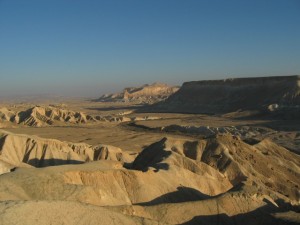 In the leadup to this week’s municipal elections in Israel, Tzafrir Rinat, the respected environmental correspondent of the daily newspaper Haaretz, discussed the local environmental political parties in his article “The Green Party – mostly bluster“. Since the other player in the field, “the Israel Green Movement” is brand new, Rinat evaluated the 10 year old “Green Party“:
In the leadup to this week’s municipal elections in Israel, Tzafrir Rinat, the respected environmental correspondent of the daily newspaper Haaretz, discussed the local environmental political parties in his article “The Green Party – mostly bluster“. Since the other player in the field, “the Israel Green Movement” is brand new, Rinat evaluated the 10 year old “Green Party“:
But in Israel, experience shows that the green parties’ environmentalism is sheer pretension, especially if compared to the green parties in Europe, which have become significant social and political factors with broad worldviews on many issues. [. . .]
The two main characteristics, in recent years, of the green parties in Europe are their democratic institutionalism and their broad political platforms. However, the local Green Party is totally different.
To this day, the party lacks any democratic setup and its worldview is worryingly narrow. It almost ignores social and political aspects pertaining to Israeli society. On the issue of peace talks, the party promises to “advance the peace process with our neighbors and the Arab world through peace and solidarity.” Not exactly a political manifesto.
The party’s activists are devoted to environmental issues but the party lacks the intellectualism that is usually part and parcel of parties sharing the same environmental-social orientation in Europe. Also, it is bereft of any significant social-minded activists. Meanwhile, it is best known for placing celebrities high on its list.
According to Rinat’s worldview, a Green party must be intellectual, and promote a social-liberal agenda, with a strong emphasis on “combin[ing] environmental issues with social ones and be able to deal with a broad range of aspects of Israeli society, like promoting peace talks and human rights.”
Rinat’s position calls for a critical look at what we really want from an environmental party: should it be a “single issue” party and limit itself to a sectorial view and work for “the environment,” whatever that is? A single-issue party like this should be at home in a left-wing government just as much as in a right-wing coalition. Its members should agree to vote in such a way that will further the environmental agenda, even if they have to support social or political laws that they disagree with – cutting welfare benefits, supporting funding for settlements, or approving a territorial withdrawal.
Alternatively, should an environmental party follow the European model presented by Rinat and define an entire liberal social and political political platform? Let’s assume, for example, the party defines a leftist and interventionist economic agenda, agressively pursues peace talks (e.g. “talk with Hamas now with no preconditions” or calls for territorial concessions as Prime Minister Olmert just did), and calls for separation of religion and state. These are all central “social and political aspects pertaining to Israeli society” that Rinat claims are missing. How many right-wing environmentalists will join this green party? Free marketers? Religious?
In the Israeli political and social reality, it seems to me that the Greens, as a small party, can best gain support for their agenda by trading their support for issues outside their environmental “core values”. In order to form enough of a consensus around their platform, the environmental politicians must prioritize their goals. They will often have to choose between the environment and other priorities, however important they might seem.
Historically, the most successful small parties in Israel have been the religious parties (before most of them became right-wing). They joined and supported all of the governments, right or left wing, in return for Ministries (usually religion, education, and/or interior), funding for their institutions, and religious legislation. Whether you agree with their viewpoint or not, they have been very successful in protecting their interests using this strategy. Also, consider the success of the Retiree’s Party in the last elections who ran on a single issue ticket, without defining a clear platform or manifesto on most of the crucial issues.
Many of the problems of Israel’s political system have been attributed to the disproportionate power of small parties, and a significant number of Israelis refuse to vote for them solely for that reason. Add to that a reluctance to vote for parties that may not pass the minimum vote requirement, and it becomes clear that there are enough inherent obstacles without adding more.
Can a Green Party afford to alienate a large segment of the voting population because of non-environmental issues? This is an issue that requires serious debate, before anyone decides to follow the European model of Environmental politics.
Links:
Tzafrir Rinat article “The Green Party – mostly bluster“, Haaretz
Green Parties World Wide
Green party – Wikipedia, the free encyclopedia
The Greens/Green Party USA
![]()




Hey Daniel,
I’m sorry I phrased that as I did – of course you were focussing on one particular aspect of Rinat’s article but I think it should be taken in the context of his overall argument. I think that Tzafrir is warning against abuse of the “green” label by attaching it to a superficial agenda and questionable motives.
I agree with you that a party with a genuine green agenda can attract members of all the supposedly separate streams of Israeli society – and if you were at the conference on Friday, or any of the previous large meetings of the new Green Israel Movement (http://www.yeruka.org.il), you would have seen just such a mix. It is very exciting and raises hope for the potential change we can make.
Nevertheless, I agree with Daniel O.’s comments above and believe that only by presenting a broad-based agenda founded on real values can such a party be relevant and provide the alternative vision for Israel’s future that our society so sorely needs. As I said in my previous post, I don’t believe this means being “leftist” or “liberal” – I think this is a new, alternative voice that can straddle previous political divides. It is, though, as Tzafrir suggests it should be, a vision which sees “environment” as necessarily combining social-political-economic-cultural issues.
I focused on the unstated, automatic assumption in Tzafrir Rinat’s op-ed that “green/environmental” must equal “left wing/liberal” – and questioned it.
This is the central issue of this post, not whether the existing “Green” parties are quality, effective or undemocratic, or any of the many other points he raises. So I didn’t miss his point, it is just not a part of this particular discussion.
Tom Friedman of the New York Times, in his manifesto The Power of Green
(http://www.nytimes.com/2007/04/15/magazine/15green.t.html) says:
“Because a new green ideology, properly defined, has the power to mobilize liberals and conservatives, evangelicals and atheists, big business and environmentalists around an agenda that can both pull us together and propel us forward. ”
He presents Green as the new patriotism, and a way of bridging the existing gaps and uniting a divided country. And he makes the case that if there is no unity, the environment will suffer. He is talking about the US, which is a lot less divided than Israel is, and it would behoove us to keep this in mind.
I’m glad this issue was raised and posted but, Daniel, you’ve missed a large part of Rinat’s point. The question is does the use of “Green” as a party name require a minimum standard of quality?
The party which has taken the name “Green” in Israel has no strong environmental background or depth. It is undemocratic, led by one man with no environmental credentials who refuses to cooperate or involve others. It has a superficial outlook on all issues including environmental has a history of a LACK of action but of taking credit for the actions of genuine environmental organizations (all of this is clear in Rinat’s article and is backed up with published data).
The new green party (http://greenerisrael.wordpress.com/, http://www.yeruka.org.il) is based on grassroots support of environmental activists and is led by two of the most capable and qualified environmentalists in Israel – Eran Ben Yemini, who founded and ran Green Course (Megama Yeruka – http://www.green.org.il) and Alon Tal who established the Israel Union of Environmental Defense (www.iued.org.il) and the Arava Institute for Environmental Studies (www.arava.org). I urge anyone who cares about a sustainable future for Israel to join the efforts of this new party and to get involved (I have no vested interest, but am myself volunteering).
Daniel, I actually do disagree with you that you can separate supposedly “green” issues from social, economic, political and cultural ones – just look around this or any other environmental site and its clear they’re connected. I do agree that a green party needn’t and shoudn’t be pigeonholed “leftist” according to the traditional division because it really represents a different paradigm.
(Finally, the biggest indictment of the fake “Greens” in Israel is that their leader has been Deputy Mayor of Tel Aviv for the last 5 years and done NOTHING to improve the environment of one of Israel’s most polluted cities – though he takes credit for a few things others have done).
I am thankful for Daniel Pederson’s intelligent, but in my opinion, flawed response to Zafrir Rinat’s op-ed in Haaretz. Daniel’s response raises important issues that must be resolved before the small, but growing, environmental community considers running two parties for the next Knesset. As someone who agrees with most of Zafrir’s editorial, I’d like to expand with my opinion on some of Zafrir’s and Daniel’s points.
1) An environmental party that is devoid of a social-economic platform is an environmental party that does not understand the underlying drivers of environmental problems. Consumption patterns, demographic trends, economic priorities, political culture, and our relations with our neighbors (and ethnic minorities in our own country) have everything to do with our environmental problems. Any purported environmental party without a clue about how to deal with these larger issues is an environmental party that has only band-aids to offer rather than comprehensive solutions. In short, even when elected they do little to help the environment.
2) The Green Party has failed to attract even the hardcore of the environmental community – precisely because it lacks any other program. Opposition to cellular phone antennas and support for bike paths do not make an environmental platform. One of the terrible trends in Israeli politics today is parties that have no ideological foundations – e.g. Kadima, Pensioners – and parties that once had, but now have none – e.g. Labor. The Green Party is indeed another fringe party without an ideological foundation. It will not attract any of the electorate that believes – rightly – that Israel has bigger issues to deal with (environmentalists, religious, right and left, alike). The rise of “City for All” and Dov Khenin and the fall of the Green Party in Tel Aviv supports the contention that even environmentalists are looking for a broader world view than the Greens offer.
3) The emerging alternative to the Green Party – one that fits the type that Rinat describes – is the Israel Green Movement. With a comprehensive vision and platform (www.yeruca.org.il), it WILL address the underlying social, economic and political drivers of our environmental crisis. I encourage everyone to check it out and decide for yourselves.
4) Three final notes; Regarding the erroneous claim that “immediate talks with Hamas” would be a part of Rinat’s ideal party; I am certain that such a brash policy would not be part of a green agenda (steadfastly pursuing peace is not synonymous with acting recklessly). Regarding the fear of alienating religious, right-wingers and free-marketers, I think the performance of the Green Party over the last 10 years has proven that most of these groups are not voting green anyway. Finally, the Pensioners party has become somewhat of a joke – they received a significant “protest vote” and disappointed most of their voters because – once again – they have nothing to offer by way of world view and landed up being lackies of Kadima. They should not be held up as a model for smaller parties.
Thanks again for opening up this important discussion. It is a crucial one to have now – at a time when Israel faces serious political and environmental challenges. More discussion is warranted and if you want to influence the shape of the new Israel Green Movement – there is a member’s meeting this Friday (14 Nov) to do just that – so now is the time to get involved!